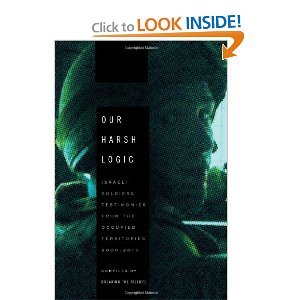@Amazon.com: Our Harsh Logic: Israeli Soldiers’ Testimonies from the Occupied Territories, 2000-2010
Book Description
Release Date: September 18, 2012
Israeli soldiers speak out for the first time about the truth of the Palestinian occupation, in “one of the most important books on Israel/Palestine in this generation” (The New York Review of Books)
The very name of the Israel Defense Forces—which many Israelis speak of as “the most moral army in the world”—suggests that its primary mission is the defense of the country’s territory. Indeed, both internationally and within Israel, support for the occupation of Palestinian territory rests on the belief that the army’s actions and presence in the West Bank and Gaza are essentially defensive and responsive, aimed at protecting the country from terror.
But Israeli soldiers themselves tell a profoundly different story. In this landmark work, which includes hundreds of soldiers’ testimonies collected over a decade, what emerges is a broad policy that is anything but defensive. In their own words, the soldiers reveal in human and vivid detail how the key planks of the army’s ostensibly protective program—”prevention of terror,” “separation of populations,” “preservation of the fabric of life,” and “law enforcement”—have in fact served to accelerate acquisition of Palestinian land, cripple all normal political and social life, and ultimately thwart the possibility of independence.
The many soldiers who have spoken out have taken aim at a silence of complicity, both within Israel and in the wider world, that perpetuates the justification for occupation. In the process, they have created a gripping and immediate record of oppression. Powerful and incontrovertible, Our Harsh Logic is a supremely significant contribution to one of the world’s most vexed conflicts.
About the Author
Breaking the Silence, one of Israel’s most internationally lauded NGOs, was established in Jerusalem in 2004 by Israel Defense Forces veterans to document the testimonies of Israeli soldiers who have served in the occupied territories.
1. Stun grenades at three in the morning
UNIT: PARATROOPERS
LOCATION: NABLUS DISTRICT
YEAR: 2003
We did all kinds of very sketchy work in Area A.* That could mean, for example, going into Tubas on a Friday, when the market is packed, to set up a surprise checkpoint in the middle of the village. One time, we arrived to set up a checkpoint like that on Friday morning, and we started to spread out: inspecting vehicles and every car that passed. Three hundred meters from us some kids start a small demonstration. They throw rocks at us, but they come maybe ten meters and don’t hit us. They start cursing us and everything. At the same time, a crowd of people gathers. Of course, this was followed by aiming our weapons at the kids—you can call it self-defense.
What was the purpose of the checkpoint?
Just to show our presence, to get into a firefight—we didn’t know whether that would happen or not. In the end we got out without a scratch, without anything happening, but the company commander lost it. He asked one of the grenade launchers to fire a riot control grenade toward the demonstrators, the children. The grenade launcher refused, and afterward he was treated terribly by the company commander. He wasn’t punished, because the company commander knew he’d given an illegal order, but he was treated really disgustingly by the staff. That’s what happened. Another time we went into Tubas at three in the morning in a Safari and threw stun grenades in the street. For no reason, just to wake people up.
What was the point?
To say, “We’re here. The IDF is here.” In general, they told us that if some terrorist heard the IDF in the village, then maybe he’d come outside to fight. No one ever came out. It seems that the goal was just to show the local population that the IDF is here, and it’s a common policy: “The IDF is here, in the Territories, and we’ll make your life bitter until you decide to stop the terror.” The IDF has no problem doing it. But we didn’t understand why we were throwing grenades. We threw a grenade. We heard a “boom,” and we saw people waking up. When we got back they’d say, “Great operation,” but we didn’t understand why. This happened every day—a different force from the company did it each time, it was just part of the routine, part of our lives.
